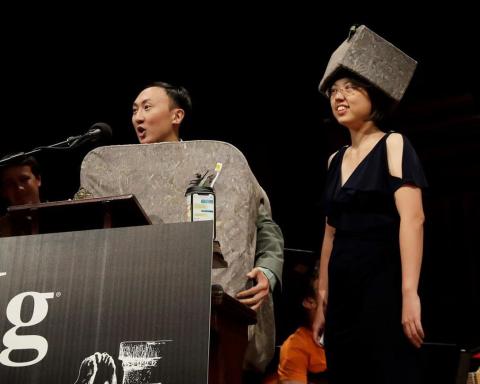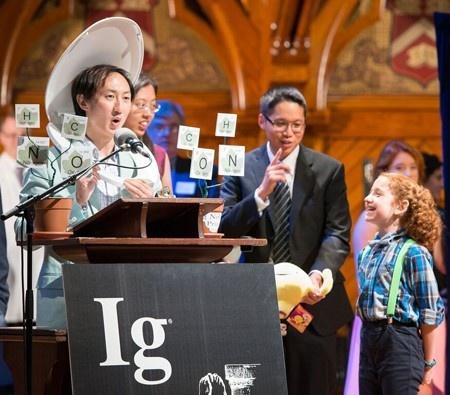event
Cube-Shaped Poo and Georgia Tech's Second Ig Nobel Prize
Primary tabs
A School of Physics Public Lecture by David Hu, 2019 Ig Nobel Prize Winner
How does a wombat produce cube-shaped feces? How long does it take an elephant to urinate?
Answering these two questions have landed David Hu two Ig Nobel Prizes, awards given at Harvard University for research that makes people laugh, and then think. Hu will talk about his lab's latest adventures catching elephant pee in trash cans, inflating wombat intestines with clown balloons, and dressing up as a gigantic piece of cubed poo at this year's Ig Nobel Ceremony.
About the Speaker
David Hu is a mechanical engineer who studies the mysteries of animal movement. His team has discovered how dogs shake dry, how insects walk on water, and how eyelashes protect the eyes from drying.
Originally from Rockville, Maryland, Hu earned degrees in mathematics and mechanical engineering from Massachusetts Institute of Technology. Currently he is a professor in the Georgia Tech Schools of Mechanical Engineering and Biological Sciences and an adjunct professor in the School of Physics.
Hu is a recipient of the National Science Foundation CAREER award for young scientists, two Ig Nobel Prizes in Physics, and the Pineapple Science Prize (the Ig Nobel of China). He serves on the editorial board of Nature Scientific Reports, PLoS One, and The Journal of Experimental Biology.
His work has been featured in The Economist, The New York Times, Saturday Night Live, and Highlights for Children. He is the author of the book "How to Walk on Water and Climb Up Walls: Animal Motion and the Robots of the Future," published by Princeton University Press.
He lives with his wife and two children in Atlanta, Georgia. His profile is in the New York Times: https://www.nytimes.com/2018/11/05/science/hu-robotics.html.
Status
- Workflow status: Published
- Created by: A. Maureen Rouhi
- Created: 09/26/2019
- Modified By: A. Maureen Rouhi
- Modified: 09/27/2019
Categories
Keywords
User Data
Target Audience



